What Size Ssd Do I Need For My Laptop
When it comes to picking the right SSD size for me, I'1000 often tempted to tell myself "the best I tin can afford" and just become from at that place.
That's pretty poor communication, and how i may end up spending more than they really need on SSD storage.
In this article, I'm going to try to steer you in the correct management for picking a tier of SSD, non just encourage you lot to spend a bunch of coin when you may not demand to.
Let'southward dive into it!
A Quick Overview of Popular SSD Sizes
500 GB or under
A 500 GB or smaller SSD is ideal for holding your operating system and a decent variety of favorite programs, including your various browsers and productivity suites.
If you lot're only using a single drive in your system, 500 GB will also provide adequate room for some low-cal media, gaming, and video storage.
In-betwixt sizes like 750 or 800 GB may also be ideal, fifty-fifty if you aren't planning on having loftier storage needs if you but intend to use a single drive in your system.
1 TB or more
A 1TB or larger SSD is ideal for holding most a dozen lx+ GB project files and games.
Depending on the calibration of your project/game, even so, individual projects/games can exceed 120+ GB with, peculiarly high-resolution assets.
In these more extreme cases, you may non exist able to fit even ten onto your SSD at once.
If you're doing High-resolution Video Editing, for example, 4K+ uncompressed footage can rapidly get hundreds of gigabytes large.
2 TB or more
From 2TB SSDs and onward, you should be scaling in accordance with what your actual needs are.
SSDs are still fairly expensive when compared to HDDs, and it's important non to use all of that valuable storage space and bandwidth on files that may non need that speed.
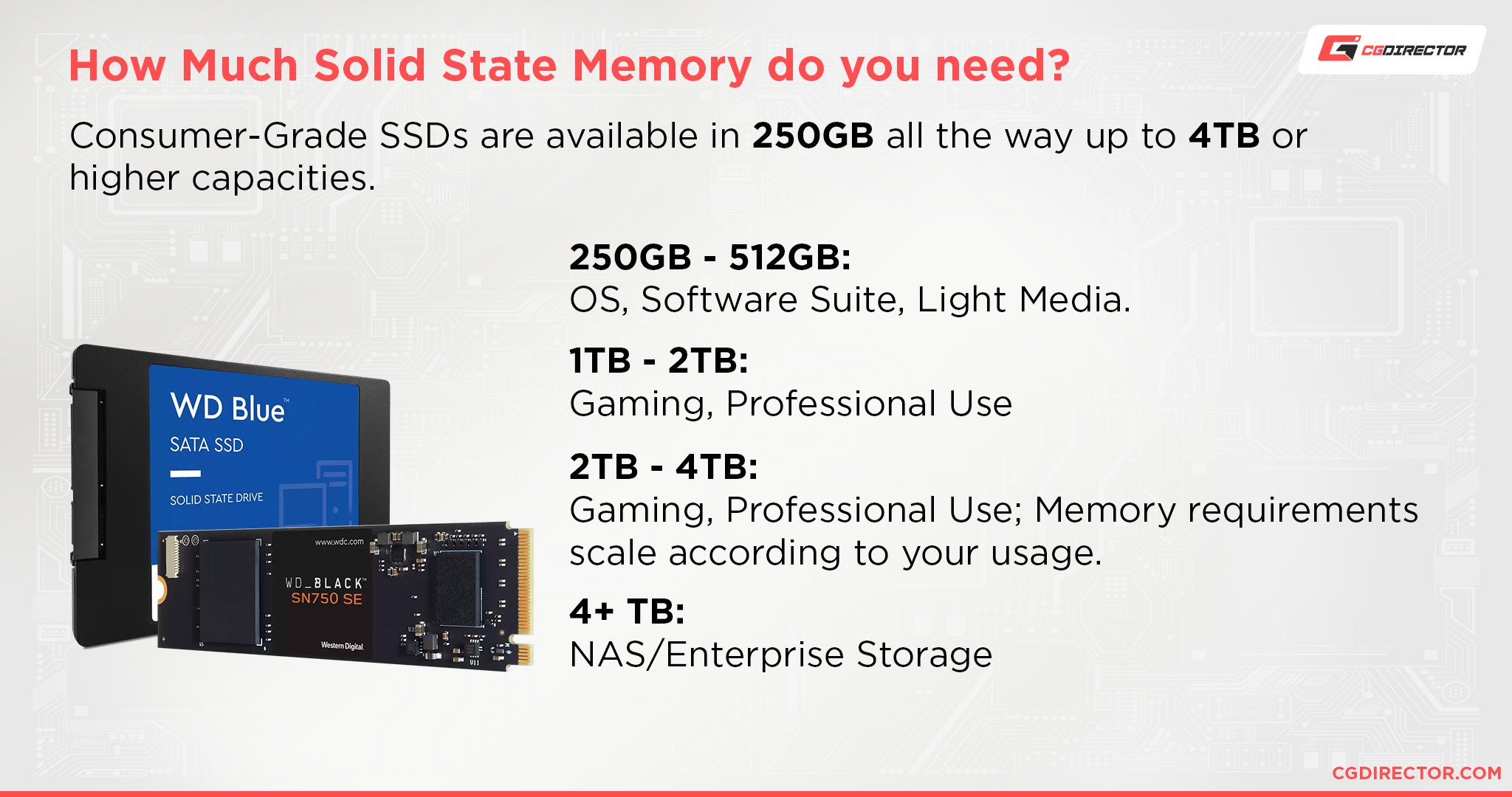
More on that below.
What Benefits From Being on an SSD
Your Operating Organization
Regardless of what you're doing with your PC, you need an operating system to brand it all piece of work.
And regardless of what operating system you're using, an SSD will serve to drastically decrease the fourth dimension it takes to boot into, update, and occasionally even repair that operating system.
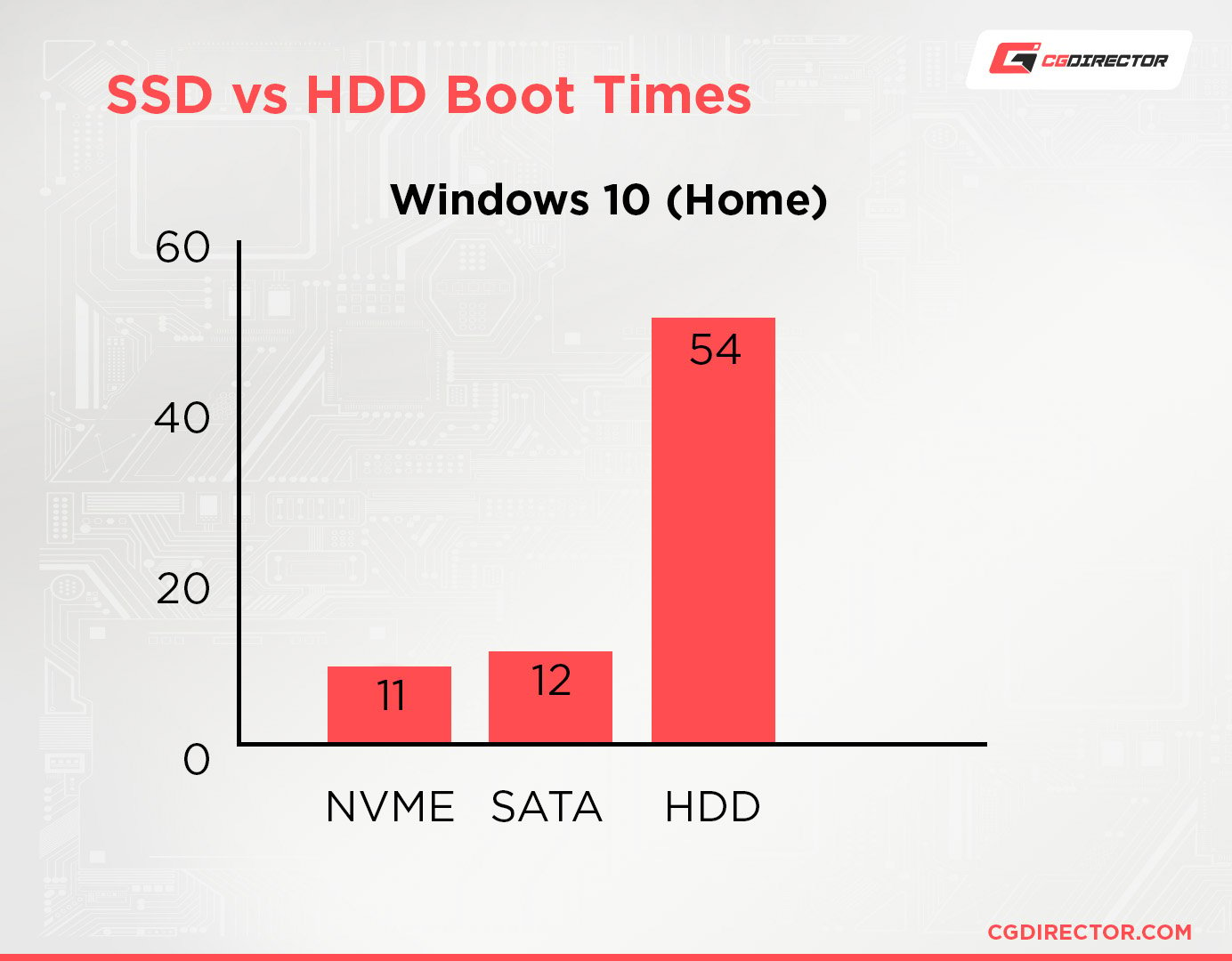
NVME SSD vs SATA SSD vs SATA HDD Boot-Time comparing (Win10 Home)
Faster storage makes a real, observable difference in common computing, only particularly when your primary operating system is stored on an SSD.
While SSDs are cheaper per gigabyte than they used to be, in the olden days this was past far the most popular and compelling reason to buy an HDD.
Fifty-fifty today, nigh PC builders volition recommend that y'all install your operating system on an SSD, even if it's only a minor 1 to go alongside a larger HDD.
Your Programs
Think of the programs you use that take the longest time to load. Or, if you like to have a lot of programs launched on Windows start-up, retrieve about how tortuously long that tin accept on an older estimator.
Your plan start-upwardly time will too be dramatically faster with an SSD than without, especially if your CPU and RAM tin can go along up with the faster storage.
Loftier-Quality Video Footage and Projects
If y'all edit video or are working with lots of high-quality assets in another environment (rendering in Blender, for case), an SSD can really come in handy.
Any experienced professional person can tell you how long information technology can have to edit a large loftier-resolution video file or import a sizable enough asset into a scene with boring storage.
While an SSD alone will not speed upwardly your actual rendering times, information technology will brand the importing and editing process much smoother and quicker than it would be otherwise, cutting down on fourth dimension wasted waiting for your PC to catch up with you.
You don't want your storage to become your bottleneck and accept other components wait idly until they tin crunch some numbers. Video Editing or Rendering are not bad examples of workloads where you lot need a counterbalanced PC-Build. In Rendering and Video Editing, you'll need to load your avails and footage into your RAM before they can exist processed past the CPU or GPU. A ho-hum HDD would be a major clogging here.
Games With Large File Sizes
Equally games increase in fidelity and scale, then too do their file sizes.
Infamously, Call of Duty: Common cold State of war could one time take up to 250 Gigabytes on your drive with all modes and loftier-quality assets installed. This has since been shrunk down to 175 GB, but it all the same speaks to the manufacture trend of larger games.
Whatsoever game's loading times will benefit from the addition of an SSD, but the latest cutting-edge titles are nearly outset to require it for a adept feel.
On the PS5 and Xbox Series consoles, NVMe PCIe Gen 4 SSDs really are required for upgrading their internal storage.
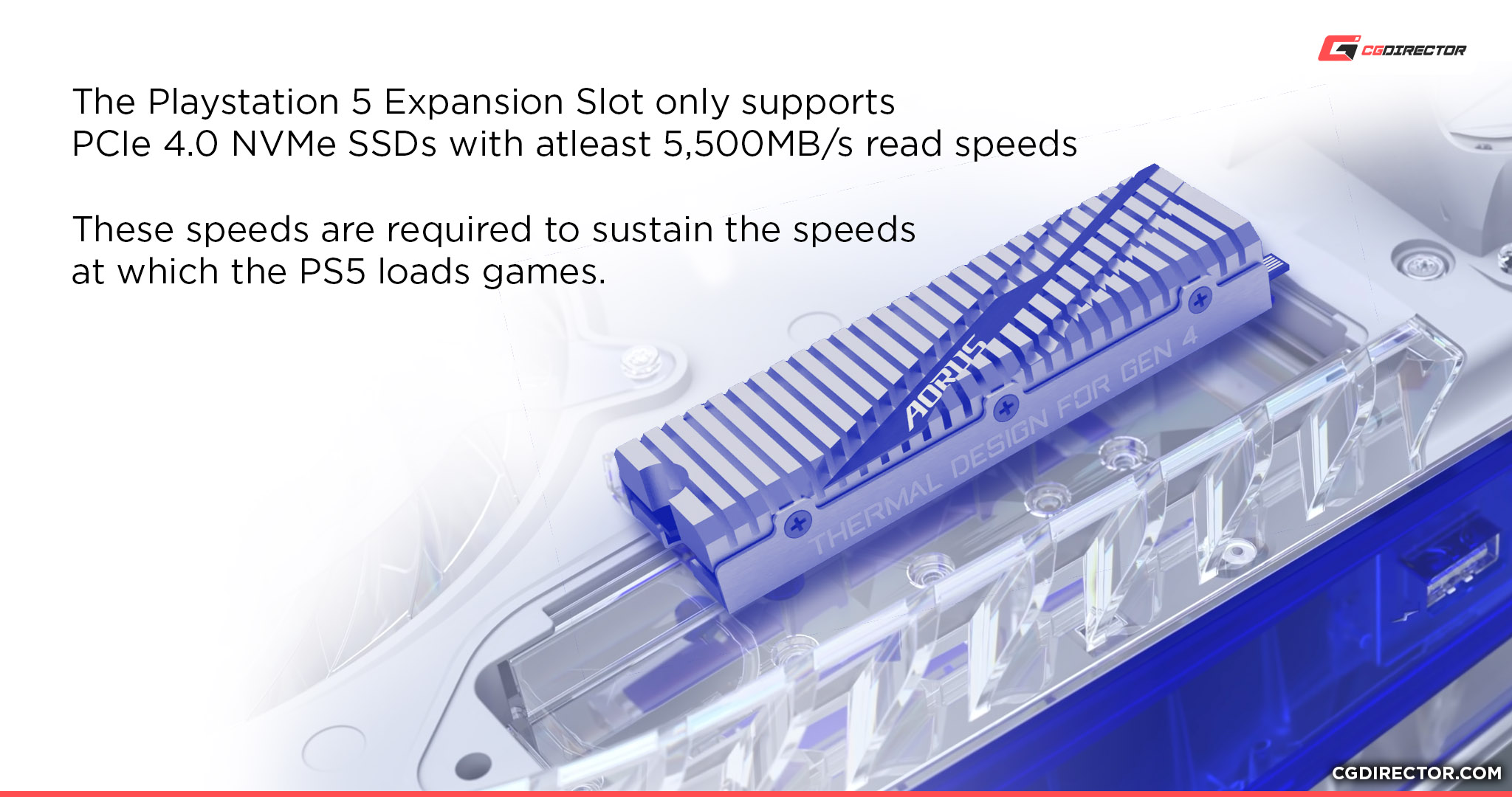
What Doesn't Benefit From Being on an SSD
Music and Movies For Playback (Not Editing)
Did yous know that your boilerplate bitrate for a 4K flick doesn't exceed 70 Megabits per 2nd?
This ways that even if yous're watching a 4K video, your average 7200 RPM Hard Drive, which is equipped for up to 180 Megabytes per second, is more than plenty for the job.
There'south no real performance reason to get an SSD for watching high-quality movies or consuming other high-end media when your standard hard drive is more than enough for the task.
Editing is some other story, though.
Games With Small File Sizes
If you're playing games with smaller file sizes, especially older games, yous may not demand an SSD.
While an SSD will still ameliorate loading times in these scenarios, games that are 8GB and under don't usually need to pull a lot of information into memory from storage very often.
Larger games- often 50-100+GB in today'due south era- may actually need that extra bandwidth, merely retro and simplistic games usually don't.
Most Images and Photos
This ties into the music and movies for consumption point, and arguably fifty-fifty well-nigh photo editing scenarios.
Static images, fifty-fifty peculiarly high-resolution ones, aren't that taxing for a difficult drive to load…unless y'all're dealing with a large number of them at in one case.
Fifty-fifty then, outside of professional editing scenarios, you don't need expensive SSD storage for virtually of your prototype storage needs.
Of class, if yous do high-resolution multi-layered Photoshop editing , with your PSDs reaching a couple of Gigabytes, and then yes an SSD will help you save valuable time writing your project files.
What To Consider Before Buying An SSD
Adding (Or Keeping) A Difficult Drive
If you lot're storing a lot of music, movies, and photos on your PC, then you may not demand to spend extra money on a larger SSD.
While at least a small SSD for your operating system and main programs will improve anyone'southward calculating feel, if you mainly utilise your PC as a media automobile, a standard 7200 RPM Difficult Drive will practise the chore for those depression-bandwidth files.
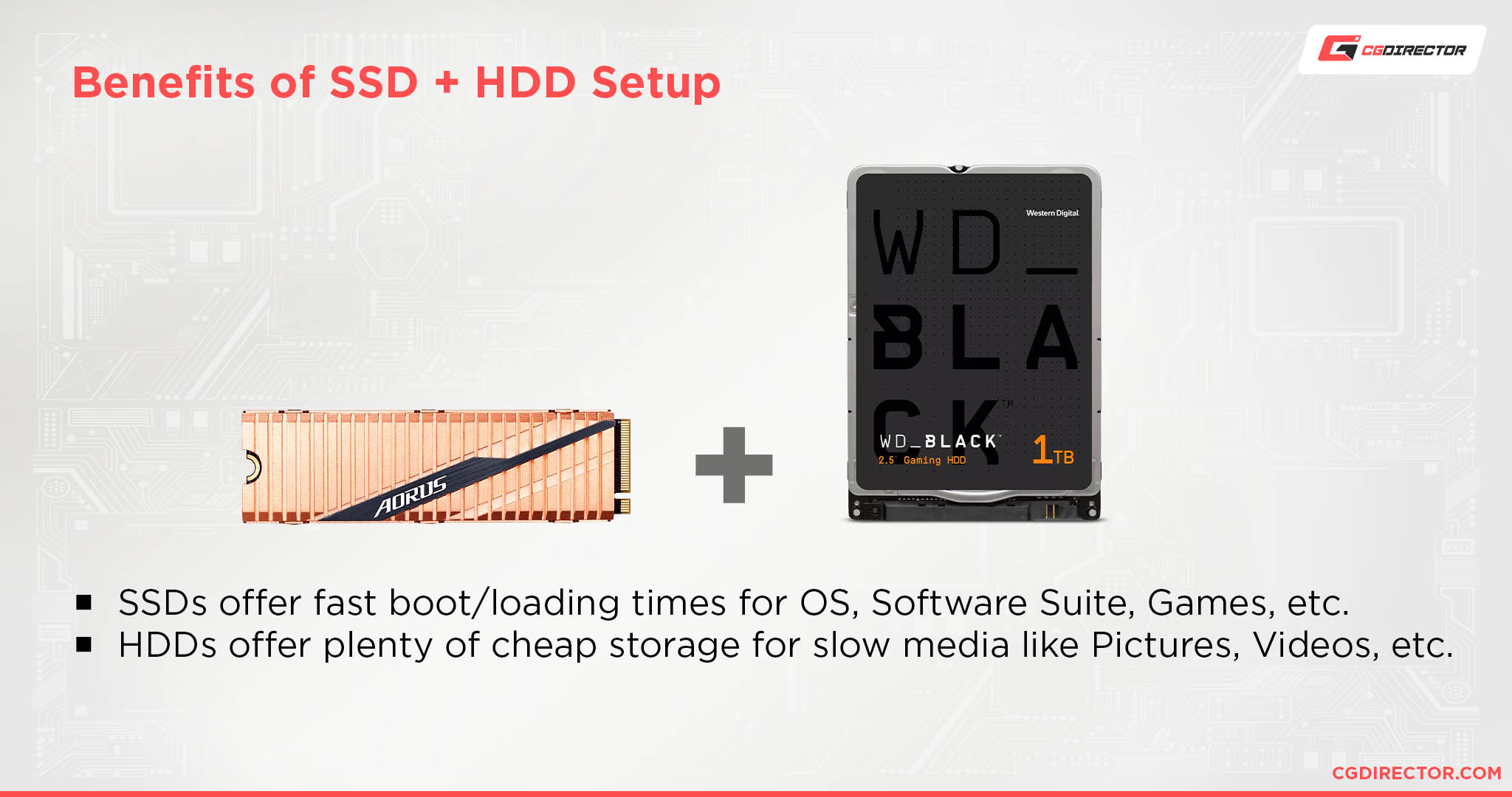
Calculation a big HDD for slow media storage can add a lot to an SSD-centric PC build. Keep this in listen if your needs aren't geared toward gaming or productivity, or y'all merely want to store a lot of media without breaking the bank.
Wearisome Media, Archiving are an HDDs strong conform. I use them mostly to back up my Data regularly later on a day's worth of work.
Are You Gaming?
If yous're using your PC as a gaming auto or are seeking out a storage upgrade for your gaming console, SSDs are prized storage.
Gaming is i of the scenarios that benefit the most from an additional SSD, especially modernistic games with large file sizes and open worlds that need to be loaded as fast every bit possible.
For cutting-border games or on PS5/Xbox Series consoles, gamers may fifty-fifty desire to opt for NVMe SSDs over SATA SSDs in guild to maximize in-game performance.
Are You Editing Video, 3D Rendering, or working in Limerick / Motion Blueprint?
If you're doing professional work in any of the above workloads, working with raw high-resolution footage, an SSD (preferably an NVMe SSD) is an absolute necessity.
While you don't necessarily need fast storage to lookout high-resolution media, editing multiple layers of it in your video editing, compositing, or 3D software of pick is some other story.
If you desire to make your editing experience more smooth and responsive, using at least a SATA SSD is highly recommended in social club to offset the demands of scanning and trimming through lots of high-resolution footage.
What SSD Size Is Correct For Me?
Professional Work
Here's what Alex has to say about storage sizes in professional person work:
As a professional, y'all earn money with your work. This ways you should spend a bit extra on higher performance that'll salvage yous fourth dimension and money in the long run and earn you back your investment.
Yous don't want your storage system's performance holding you back when those deadlines are creeping ever closer. And yous especially don't want your drives to exist full all the time as that'll both subtract your SSDs operation and makes you delete or move around projects and files unnecessarily – which slows you lot down even farther. Beingness competitive in this day and age includes relying on an optimized PC more than e'er.
Optimizing for ample storage and functioning, hither'south my recommendation:
Video Editing, Motion Design, Compositing, 3D Rendering. Anything that involves usage of high-res (uncompressed) footage:
- First Bulldoze: 500GB NVMe SSD (better 1TB) for your OS and applications to exist stored on
- 2d Bulldoze: 1TB NVMe SSD (better 2TB) for your active project-files/footage to be stored on
- Third Drive: 1TB NVME SSD (Better 2TB) for your OS's Pagefile and your Application Caches to be written to
- Fourth Drive: 8TB RAID 10 HDDs (e.one thousand. in a NAS) for backing upward your projects daily. Movement any projects, that you are not working on in the foreseeable time, hither from your active bulldoze
- Fifth Drive: 8TB HDD for your second backup on a dissimilar PC / location. Backups fail, don't rely on but one backup
I even have a third backup because my livelihood depends on me having those files at the fix.
The above configuration works well for me in my daily work as a 3D Artist, Video Editor, and Move Designer. It might be over the top for hobbyists or for just doing photo-editing on smaller files.
My advice for professionals is to buy one level up from what yous recollect you need. Get an NVMe SSD if you lot think you but need a SATA SSD. Get 2TBs if you think you lot'll only use 1TB. I've upgraded my storage size multiple times over the years because I keep running out. And cloning your agile projection drives onto a large drive mid-projection with the client breathing down your neck is not something I'd wish upon anyone.
Gaming
If your demands don't involve gaming or professional work, I recommend a ~500 GB SSD for installing your operating system and your favorite programs. You can use hard drives, external or otherwise, for the residuum of your storage needs.
If your demands involve gaming or professional person work, I recommend a 1TB SSD every bit a baseline.
At this point, the size of the SSD that yous're aiming for is going to direct scale to how many big modern games or project files y'all want to go along on your system at once.
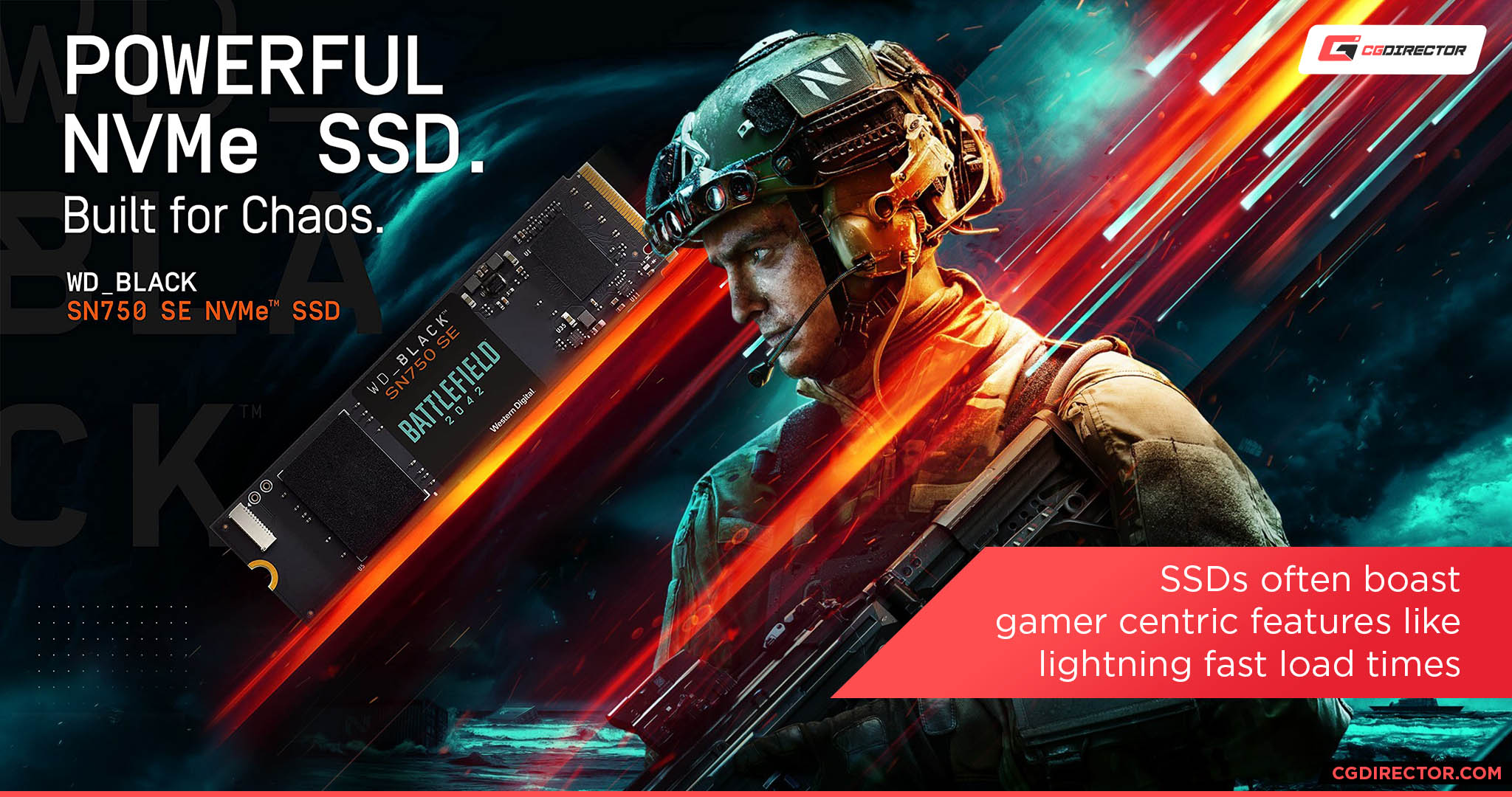
Every bit a gaming example, cut-border modern games like Red Expressionless Redemption 2 can have file sizes of 150 GB and higher. This means that a 1TB bulldoze dedicated explicitly to gaming can store, at all-time, six games of that file size.
Not every game will be that large, of class- but with a large games library and the ever-increasing file size of games in general, yous can run into that limit surprisingly speedily.
Equally an editing and productivity example, my ain Captures folder regularly reaches 50+ GB for a single tightly-edited 5-10 infinitesimal video project. Whether you lot're recording loftier-quality video or working with lots of high-resolution avails, project file sizes can balloon upwardly to and past 50 Gigabytes surprisingly hands.
In these cases, having a 1TB SSD volition permit you to manage multiple large projects at in one case, with larger sizes permitting yet more than parallel projects or archival purposes.
FAQ
What Other Factors Should I Consider When Comparison SSDs?
Likewise storage size, it'southward also important to know other core SSD specs when it comes fourth dimension to choose an SSD. For instance, whether an SSD uses SATA bandwidth or PCI Limited bandwidth will determine its maximum possible speed.
ISSDs tied to SATA bandwidth (whether by being full SATA drives or but K.2 drives that utilise SATA bandwidth) are going to exist much slower than NVMe SSDs.
The rough limit of SATA-based SSDs is nearly ~550 MB/s, whereas NVMes start in Gigabytes per 2nd. NVMe SSDs come in either expansion card or G.2 format.
And so if you've found 2 SSDs of similar price and size just one is NVMe and 1 isn't, definitely make sure you get the NVMe drive if your system can support information technology.
Are In that location External SSDs?
Yeah! In fact, External SSDs can be pushed far plenty to compete with modern NVMe Gen iii SSDs, so long as the system you're using supports Thunderbolt 3, Thunderbolt 4, or another super high-speed connexion standard.
If for whatever reason you need to do your SSD-heavy tasks with an external drive (perhaps if you lot're using a laptop that doesn't have room for whatever more drives), an external SSD may be an ideal choice for you lot.
Where Do I Get The Fastest SSDs?
If you desire an SSD and you lot're simply interested in the fastest options on the market, then you'll definitely desire to get an NVMe SSD instead of a SATA-based SSD.
SATA SSDs are still faster than HDDs but are limited by a standard that was fabricated for mechanical difficult drives.
With an NVMe SSD, you lot can get well-nigh-untethered access to the extremely fast PCI Express bandwidth on your system, assuasive for speeds measured in total gigabytes per second.
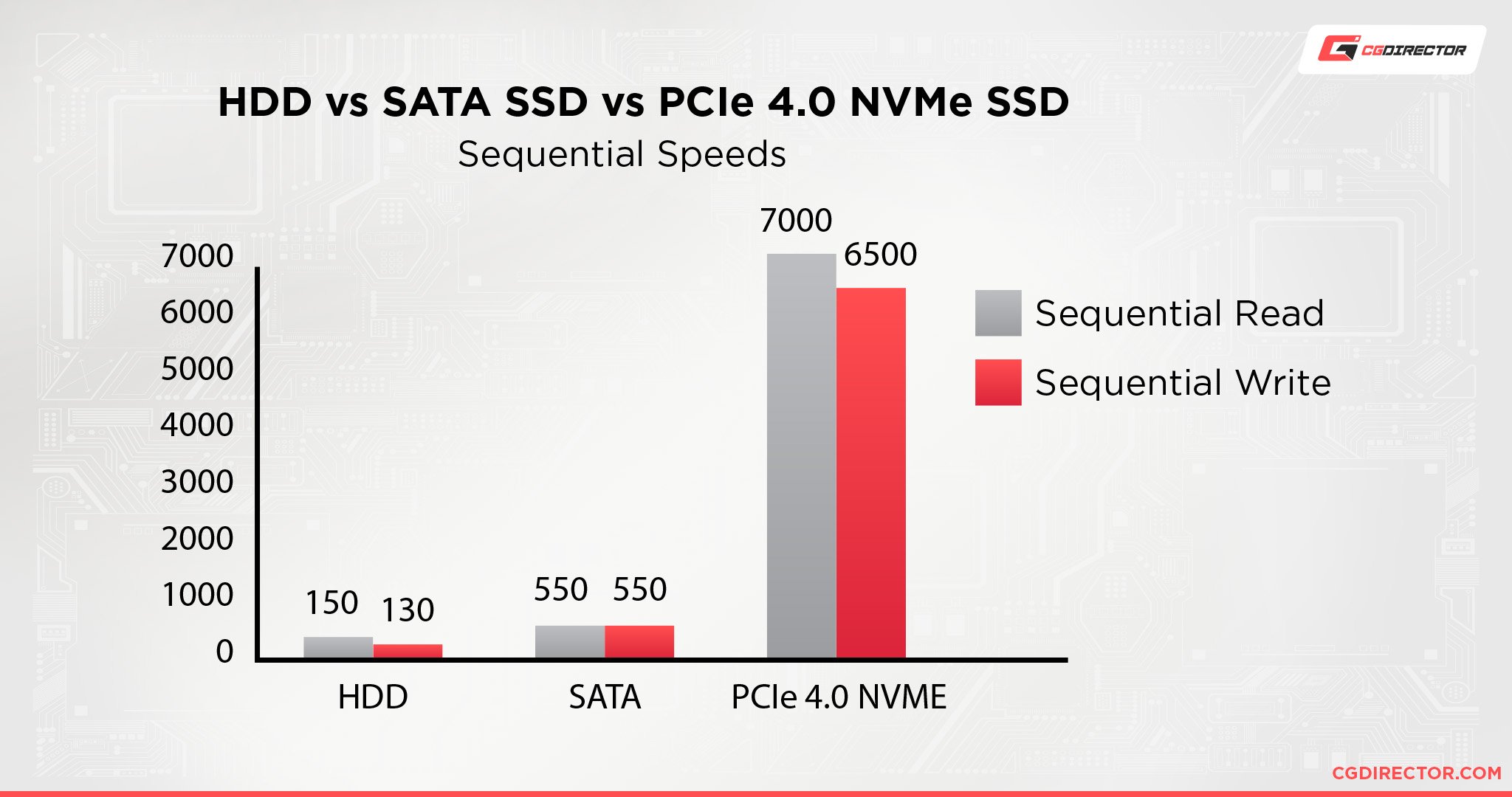
If this sounds compelling to yous, I've compiled a list of the best NVMe SSDs on the market in this article, every bit well every bit a detailed guide on NVMe SSDs in general. Caput in that location if you lot need help picking out a great SSD for your productivity or gaming PC build.
Over To You
And that'due south it, for now! Permit us know in the comments below or in our forum if yous take any other questions or still demand assistance determining what kind of SSD size you should be aiming for. This guide should requite you a practiced place to starting time, though!
CGDirector is Reader-supported. When yous buy through our links, we may earn an affiliate commission.
What Size Ssd Do I Need For My Laptop,
Source: https://www.cgdirector.com/ssd-size/
Posted by: chongdamitish.blogspot.com


0 Response to "What Size Ssd Do I Need For My Laptop"
Post a Comment